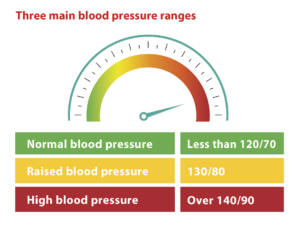Get Checked - Before Damage is Done
Everyone has a blood pressure. Your blood pressure is a measure of the force your heart uses to pump blood around the body.
How is blood pressure measured?
Two numbers measure the level of your blood pressure.
- Systolic pressure is the pressure when the heart muscle beats to pump blood to the rest of your body – this is the top number.
- Diastolic pressure is the pressure when your heart relaxes between beats – this is the bottom number.
What is a normal level of blood pressure?
The normal level of blood pressure is less than 120 (systolic) over 70 (diastolic).
What is high blood pressure?
High blood pressure is blood pressure that is consistently higher than normal. The medical term for high blood pressure is hypertension. The ideal blood pressure is less than 120/70. For most people, high blood pressure is 140/90 or more. This will be lower if you have other conditions like diabetes or kidney disease or if you’ve had a stroke or already have heart disease.

Why is blood pressure important?
High blood pressure carries risks for a number of serious conditions. The higher your blood pressure, the greater your risk of heart attack, stroke, heart failure, kidney failure, dementia and some forms of blindness.
Often high blood pressure comes with no symptoms so the only way you can make sure your blood pressure is fine is by getting it checked regularly.
If you feel faint or dizzy when you stand up from a lying down or sitting position or when you bend over, you have low blood pressure. This is also called postural hypotension. If this happens to you, tell your doctor and have your blood pressure taken when you are standing up.
When and how to check blood pressure
The only way to look after – and know if you have – high blood pressure is to have it measured.
Try to get your blood pressure checked regularly and ask what your reading is. If you are under 40, it’s best to have your blood pressure checked once every 3 years. If you are over 40, you need to get your blood pressure checked once a year. If your blood pressure is found to be raised or high, you’ll need to get it checked more often by a doctor or nurse.
Many pharmacies are now offering blood pressure checks and some do 24-hour blood pressure monitoring. Sometimes your doctor will suggest you buy a reliable blood pressure monitor and measure your blood pressure regularly at home.
How to Take your Blood Pressure at Home
How to control your blood pressure
Knowing your blood pressure is key. If your blood pressure is only mildly high, the following small steps or lifestyle changes may help to reduce it. Other times, you may need to take medication to control your blood pressure.
Manage Your Blood Pressure Leaflet
Our leaflet can help you to reduce your risk of heart disease and stroke
Download now
FREE Blood Pressure & Health Checks
Get your blood pressure and pulse checked for free through our Mobile Health Unit
Learn more

